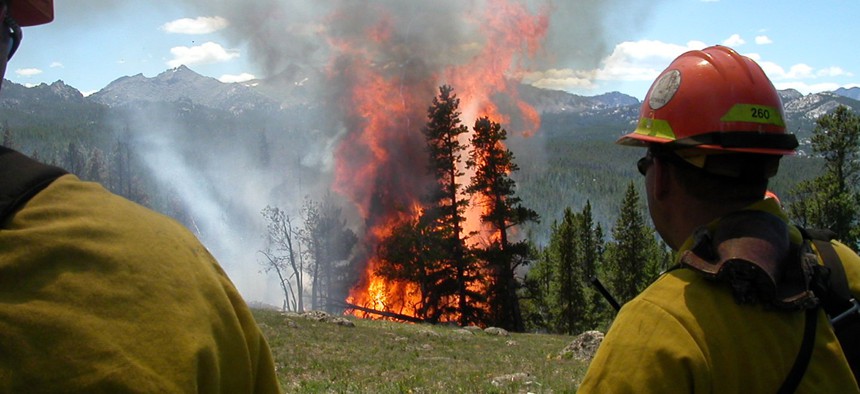
The continuing resolution passed on Sept. 30 extended federal woodland firefighters' current pay levels until Nov. 17. ertyo5 / Getty Images
The federal firefighter ‘pay cliff’ has been averted, for now
The 45-day continuing resolution preventing a government shutdown also includes language ensuring federal firefighters don’t lose access to recent pay increases whose funding was expected to run out this month.
The long-feared mass exodus of federal wildland firefighters will have to wait, as Congress approved an extension of funding for recently instituted pay raises for the occupation last weekend as part of a deal to temporarily avert a government shutdown.
The continuing resolution, which passed just hours before federal agencies were set to begin shuttering due to a lapse in appropriations, funds federal agencies at fiscal 2023 levels for 45 days, an unlikely end to weeks of brinkmanship caused by an extended mutiny by a band of House conservatives against Speaker Kevin McCarthy, R-Calif.
The measure has even greater significance for federal firefighters. In addition to preventing them from being furloughed or forced to work without pay during a shutdown, the CR ensures that temporary raises of 50% of their base pay or $20,000, whichever is less, authorized in 2021 as part of the bipartisan infrastructure law and implemented last year, will continue to be paid until Nov. 17.
Federal wildland firefighters and organizations that represent them have warned for months that the money set aside for the pay raises, which were instituted because of the wide disparity in compensation between federal firefighters and their state and locally employed counterparts, will run out this fall. Absent congressional action, officials estimated that the Agriculture Department would run out of funding to maintain firefighters’ pay on Nov. 4, while the Interior Department would have been forced to rescind last year’s pay raises in mid-October.
Federal employee groups have warned that if the temporary raises are allowed to lapse or otherwise not made permanent, between one-third and one-half of federal wildland firefighters will seek employment elsewhere.
The continuing resolution allows USDA and the Interior Department to use unused money from fiscal 2023 appropriations to continue to fund the pay raises for 45 days, as well as to use new money if those funds run out in the meantime. Steve Lenkart, executive director of the National Federation of Federal Employees, whose union represents more than 10,000 federal wildland firefighters, said money set aside to provide firefighters hazard pay and mental health support would not be used to pay for firefighters’ regular salary during that period.
“At the end of the 45 days, it’s presumed that all of those alternative sources of funding will be extinguished, definitely for Interior, although I’m not sure about USDA,” he said. “But whatever it is, after the end of the continuing resolution, we’re going to need something else to make sure that the current rate of pay isn’t dropped off a cliff. What we’re hoping for is permanent language [cementing the pay raise], as opposed to Band-Aids on top of Band-Aids.”
Lenkart said the goal is for Congress to approve the Wildland Firefighter Paycheck Protection Act, a bipartisan bill that would make last year’s pay raises permanent as well as create a new pay supplement to pay them for days they’re mobilized, by mid-November, and then to rally support behind the Tim Hart Wildland Firefighter Classification and Pay Parity Act, which includes a number of other measures aimed at improving the working conditions of federal wildland firefighters.
“I’m really glad that we at least got 45 days’ worth of assurance that firefighters will be paid,” he said. “But I don’t think I’m any more comforted by this, aside from the bipartisan show of support [to extend the pay raises temporarily]. That said, of all of the things that they argued about in the House, firefighter pay was not one of them.”







